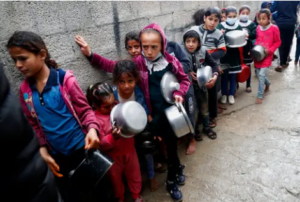‘Just hit Gaza harder’: no end in sight for Israel’s collective punishment of two million Palestinian civilians

Children wait in line to receive free meals in Gaza City this year as poverty and unemployment rates in Gaza hover around 50%
Tania Hary writes in Haaretz on 19 September 2021:
The expression that if all you have is a hammer, everything starts to look like a nail applies to Israel’s relationship with Gaza with tragic accuracy. Successive Israeli governments continue to pretend that if they just hit Gaza harder, they’ll get what they want.
Foreign Minister Yair Lapid’s speech at Reichman University in Herzliya last Sunday revealed that this current government is no exception.
Israel, which often claims that it ‘left Gaza’ during the 2005 disengagement, has actually been enforcing a strict closure on the territory and has rained four major military campaigns as well as hundreds of more minor raids on the Strip, not to mention near nightly air and drone sorties, and attacks on Palestinian fishermen and farmers.
It’s sometimes quiet in the Israeli villages, towns and kibbutzim abutting Gaza, when illegal rockets are not launched, but it’s never quiet in Gaza where pressure on civilians is a constant feature of day-to-day life.
Lapid announced his government’s policy towards Gaza as though it weren’t just a rehashing of previous governments’ failed ideas. He said: “It’s time to cause the residents of Gaza to pressure Hamas because they understand what they are missing out on as a result of terrorism and understand how much they stand to gain if that terrorism stops…We will present a plan to improve life in Gaza if Hamas stops behaving like a radical terrorist organization.”
Former Prime Minister Benjamin Netanyahu called it “quiet for quiet,” whereas current Prime Minister Naftali Bennett calls it “shrinking the conflict. “The premise is the same: Palestinian civilians will pay the price for the actions of their de facto leadership or militants, over whose actions they have no control. In other words, collective punishment, a war crime, and the prospect of it worsening continue to be the official policy of the Israeli government.

Inspecting damage to a poultry farm, after early morning Israeli airstrikes in Rafah, southern Gaza Strip, September 2021
To be clear, Hamas and other militants are also engaging in war crimes when they fire rockets indiscriminately on civilian population centers in Israel. Here too, the same rules and principles apply – actions which target civilians are prohibited.
Actually resolving the conflict, as opposed to just “shrinking” it, would involve removing the grievances which perpetuate it: Ending human rights abuses, acknowledging past wrongs, enforcing accountability, and starting a process of reconciliation. A truly fresh perspective by this government would entail acknowledging that two million civilians, half of them children, live in the Gaza Strip and they have the same rights and dreams as humans everywhere – to be free, to be safe, and to provide for future generations.
A new approach would mean Israel taking responsibility for its control over Gaza and to stop wielding it to inflict pressure on civilians, undermining Gaza’s frail economy and its civilian infrastructure, separating families and preventing local and international organizations, engaged in aid and humanitarian work, to help.
You can’t distract people from their subjugation with a few extra hours of electricity, more food, or even more jobs. As much as these things are critical for Gaza, they aren’t enough. Humans will always strive for freedom and justice. Besides, improving the humanitarian situation and respecting basic human rights are Israel’s responsibility, not “carrots” it should be allowed to dangle, against the very big stick of continued closure, persecution, and military fire.
If Lapid and his government want credit for doing things differently and in a way that will eventually yield results for all the people who live in the region, he should set down the hammer and lead the government in recognizing its obligations towards Palestinians, particularly the long-suffering civilians of Gaza.
Tania Hary is the executive director of Gisha – Legal Center for Freedom of Movement
This article is reproduced in its entirety.
